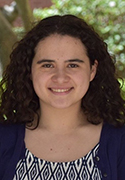 Shannon Berneche joined the program on January 1, 2021, while a first-year student, and is expected to graduate in 2025. Her graduate program is neuroscience, and she completed her undergraduate degree in molecular and cellular biology at the University of Illinois at Urbana-Champaign. She presented her research at the American Society for Mass Spectrometry annual conference in June 2022 and completed her first-year project for the Neuroscience Program in February 2022. She is advised by Jonathan Sweedler and Martha Gillette.
Shannon Berneche joined the program on January 1, 2021, while a first-year student, and is expected to graduate in 2025. Her graduate program is neuroscience, and she completed her undergraduate degree in molecular and cellular biology at the University of Illinois at Urbana-Champaign. She presented her research at the American Society for Mass Spectrometry annual conference in June 2022 and completed her first-year project for the Neuroscience Program in February 2022. She is advised by Jonathan Sweedler and Martha Gillette.
Berneche has participated in the Special Topics in MBM course as well as other trainee activities such as the annual MBM Retreat (in which she won an award for Best Lightning Talk in 2021), the Summer Journal Club readings/discussion meetings, and Frontiers in Miniature Brain Machinery lectures. She has also completed coursework in research ethics in addition to neuroscience coursework. In January 2021 she attended the Reach Out Science Communication Challenge virtual workshops offered through NSF and the Museum of Science in Boston.
In addition to her academic achievements, she has also been active in public outreach. In April 2022, she and fellow trainee Taylor Jorgensen spoke with elementary science education students at Illinois State University. This outreach has helped future science teachers enhance their understanding of scientific concepts that can be passed on to future elementary school children.
“They definitely seemed interested in research and students’ questions focused on how research works in general as well as how it’s done in each of our labs,” said Berneche. “I think it was useful for the students to learn about how research is done, as well as learning about some of our research which Taylor and I explained at a simpler level than we’re used to in order to allow the teachers to bring it to an even simpler level (i.e., for elementary students).”
In May, Berneche co-organized Brain Awareness Day activities with the Illinois Neuroscience Program, as well as Science night at Southside Elementary School. which included two events: a science night at South Side Elementary School and classroom visits at Edison Middle School. “During these events, kids had fun touching sheep brains while learning fun neuroscience facts and learning about how they perceive taste by eating different colors of jelly beans while covering their nose,” she explains. “I appreciate how the MBM program has also helped me find opportunities to become involved in science outreach.”
She will be participating in the Beckman Open House in March 2023 with her lab to educate the public about what they do and teach about scientific research. In December 2022, she created a one-page educational resource for middle- and high-school teachers. It provides a helpful overview of mass spectrometry in easy-to-understand language that teachers can use to teach the subject to students. She has also mentored undergraduate students in the Sweedler Research Group.
Berneche’s research has involved using mass spectrometry and complementary analytical techniques to characterize the endogenous peptide profiles of biological fluids, which helps to better understand the biochemical processes occurring under both normal and pathological conditions. During the 2021-2022 academic year, she tested many methods for peptide extraction to reduce the complexity of CSF and serum samples from both humans and rats, as well as methods for fractionation, mass spectrometry data acquisition, and peptidomic data analysis. This was all to establish reproducible methods which allow me to identify as many peptides as possible in the samples while keeping peptides in their endogenous chemical states.
Shannon Berneche’s presentation on the “Characterization of the Glymphatic Peptidome by Mass Spectrometry” at the 2022 MBM Retreat
From September through December 2022, she completed a three-month external research experience at Northwestern University in the lab of Dr. Neil Kelleher under a research professor, Dr. Steve Patrie. The experience introduced her to working on glycoprotein analysis, which dovetails with the endogenous peptide analysis she has been conducting in the Sweedler Research Group at Illinois. She also participated in research to better understand Alzheimer’s disease by analyzing amyloid beta proteoforms in both animal models and human tissue samples. This led to her own increased understanding of pathology of the brain and how mass spectrometry can be used to understand this important topic.
In her own words:
I have gained experience in interpreting mass spectrometry data that I will definitely be able to use in my own work, although the questions that my research aims to answer and the techniques used both have some differences from the lab where I am completing my external experience. It also helps to see other approaches to solving problems that are similar in some ways to those in my own lab. I feel more prepared for my future career in research because I have gained experience with other types of instruments, and this is very helpful in understanding the field of mass spectrometry even better, and for gaining a better understanding of the work being done in other labs.
In addition, I was involved in research aimed towards understanding Alzheimer’s disease by analyzing amyloid beta proteoforms in both animal models and human tissue samples, which increased my understanding of pathology of the brain and how mass spectrometry can be used to understand this important topic. Overall, this was a very valuable experience and I am very grateful to the MBM program for supporting it. I know that it has made me a more knowledgeable, well-rounded and better researcher, and I am excited to get back to my lab and apply what I have learned in my own work.
I really appreciate that the MBM program has provided me with this opportunity, as I believe this has allowed me to grow as a researcher in ways that I couldn’t have just by working in the same lab during my entire PhD,” Shannon explains. “It’s helpful to learn new skills and techniques and to find similarities and connections between the research in your own lab and in others. This will allow me to expand my work to other interesting areas and to think differently about the work I am doing.

